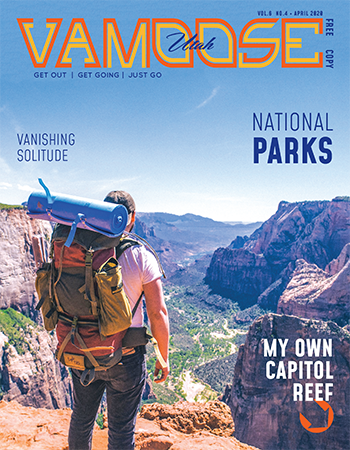Taking your dog hiking is more enjoyable with proper training
By Nicole McNulty
It can feel like you’re stuck between a rock and a hard place. The dog park allows you to let your best friends off their leashes, but for your pet, it can be overstimulating and intimidating. Yet, to take them to more natural surroundings, we learn that many nearby canyons don’t allow dogs, and many that do require dogs to be on-leash. So, where can you comfortably, and safely, take your furry friend off- or on-leash?
First, consider the type of exercise. It’s logical to assume that running gives your dog the best workout. But, according to obedience trainer Jan Perkins, who has been training dogs since 1978, walking is actually the ideal workout because it not only helps dogs release physical energy but trains their minds as well.
Perkins, who operates Live Oak Dog Obedience Utah in Sandy, says that when a dog runs, adrenaline builds up in their system and makes them more hyper. By walking a dog and training them to heel, it tires them out and helps with keeping them close to you when they’re off-leash.
This proximity is vital not only for peace of mind, but for the safety of both you and your dog. Perkins utilizes e-collars set to the lowest rating not for obedience training but to reinforce what the dogs have learned. If you choose to use an e-collar, it can help you feel more comfortable letting your dog off-leash and more confident that your dog will respond to you when called.
While walking, there are quite a few trail hazards to be aware of. First and foremost are the outdoor elements: heat and cold. Utah summers can be brutally hot. “[Dogs] only sweat through their tongue and their paws,” Perkins says. Because they can get overheated very quickly, you need to bring plenty of water for both you and your pup. Pick up a collapsible dish for them to drink out of or pour water onto their tongues straight from the bottle if your dog is a skilled lapper.
Though you’ll be carrying most of their water, dog packs are a great way to lessen the load for yourself. Be careful not to load any more than 10 to 20 percent of the dog’s weight in its pack, Perkins says. Packs have added benefits as well: For dogs that are naturally high strung, packs tire them out faster because when the pack is on, they feel like they’re working, Perkins says. Be sure to load it evenly and make sure it fits well without rubbing or chafing. Packs also allow you to pick your dog up in an emergency or stop your dog more quickly.
When it comes to the cold, booties and jackets help protect them. Dogs might have tougher paws than humans do, but ice—especially salted ice—can do serious damage, Perkins says.
When using gear, start out slowly and build up to make sure they’re comfortable wearing it. Begin with shorter hikes and increase the distance as your dog gains strength. With dogs under 4 months old, be careful where you take them because they haven’t received their shots yet. A puppy should remain on a leash until they’re at least 6 months old, Perkins says.
Wild animals represent another trail hazard. Bear, moose, mountain lions and rattlesnakes can be a serious threat, which is why it’s important to only go places you feel comfortable and in control of your dog.
Perkins will host a rattlesnake-avoidance class in June that will stick with your dog for life, she says. The snakes are de-fanged, and it’s held in a controlled environment.
“Get in the habit of teaching them something new,” Perkins says. “Always challenge them to that next level, and they will go as far as you take them.”
One way to facilitate that continual learning is through structure. Formal obedience classes aren’t necessary, but the positive thing about them is that they keep both you and your dog on track and engaged with each other, Perkins says. Avoid overindulgence, she adds. You want your dog to work because they love you, not because they want a treat.
“I think the bottom line is manners,” Perkins says. “Both with you and your dog.”
If we set a good example for our furry friends, keep an eye on the surrounding environment and have the correct gear, the wilderness becomes our playground.
Summer Dog Festivals & Events
Looking to socialize on behalf of—or in some cases with—your furry friends? Check out these events:
No Kill Utah Super Adoption, May 4-5
Held at the Legacy Events Center, dogs and cats go home by the hundreds at this adoption fair. If you’re looking for a new furry friend, this is the place for you! Learn more at NKUT.org/Get-Involved/Events.
Wags to Riches Gala, May 11
The seventh annual Wags to Riches gala, hosted by the Humane Society of Utah, features a silent auction, dog runway show and gourmet vegetarian dining. Information at UtahHumane.org/Gala.
Bark at the Moon, Aug. 17
Hosted by the Humane Society of Utah, this after-dark festival includes a 3K- and 5K- dog walk/run and is held at Utah’s Cultural Celebration Center. Don your glow gear and get on the move with your best furry friend. More information at UtahHumane.org/BarkAtTheMoon.
Soldier Hollow Classic, Labor Day Weekend, Aug. 30- Sept. 2
The world’s premier Sheepdog Trial and Festival doesn’t just feature amazing herding dogs competing for the top slot but also agility trials and the famed dock dogs (the latter two of which you can enter your pup in!). Spectator animals aren’t allowed, but bring the family and enjoy amazing animal feats for the weekend. Tickets available at SoldierHollowClassic.com.
Strut Your Mutt, Oct. 12
The country’s largest Strut Your Mutt event is held at Liberty Park (600 E. 900 South, northwest corner) and proceeds go to support Best Friends and other animal welfare groups. Join the party and support a good cause! Details at StrutYourMutt.org.



